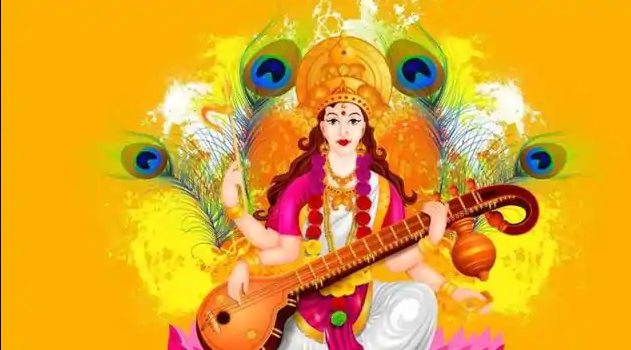
Vasant Panchami 2021: Saraswati puja

Vasant Panchami 2021: Here’s all you need to know about the date, history, significance, celebration of the Spring season in India, and what time is the shubh muhurat for performing Saraswati puja
Marking the preparation for the arrival of spring, Basant Panchami or Vasant Panchami is an auspicious festival of the Hindus which is celebrated with great pomp and show across India on the fifth day (Panchami Tithi) of the Hindu month of Magha, Shukla Paksha. It is also called Sri Panchami in the South and is dedicated to Saraswati, is the wife of Brahma, and considered by Hindus as the Goddess of knowledge, music, learning, and arts.
Worshippers believe that without Saraswati the world would be shrouded in ignorance, as she is the one who represents enlightenment. Hence, Saraswati is worshipped on this day along with celebrating the agricultural fields’ ripening with yellow flowers of the mustard crop.
Yellow or Basanti is believed to be Saraswati’s favourite colour and all celebrations include a shade of yellow be it in decorations or attires. Vasant Panchami is also believed to be the most auspicious day to get married.
Date and Puja Time:
This year Vasant Panchami shall be observed on February 16, 2021. The Panchami Tithi shall start at 3.36 am on February 16 and will continue till 5.46 am on February 17. Although the entire day is considered as being auspicious, the right time for doing the puja is in the afternoon.
This year, the following timings are to be observed:
Vasant Panchami Muhurat: February 16 at 06:59 am to 12:35 pm
Vasant Panchami Madhyahna: 12:35 pm
Start of Panchami Tithi: February 16 at 03:36 am
End of Panchami Tithi: February 17 at 05:46 am
History:
As per Hindu mythology, Brahma created the universe and impressed with the creation, and wanted to see it with his own eyes. Hence, he set out on a journey but was disappointed with the complete silence and loneliness of everyone on planet Earth.
After giving it a lot of thought, he had an idea and had an idea according to which he took some water in his Kamandal and sprinkled it in the air. An angel with a harp in her hand appeared from a tree and was requested to play something.
Brahma asked her to do this so that the Earth was not silent and the angel obliged to bless the people of the Earth with her voice, filling the planet with music. That angel came to be known as Saraswati or Veena Vadini (harp player), the Goddess of speech, knowledge, music, and art who provides voice, intelligence, force, and glory.
Significance:
Spring is considered to be the ‘King of all seasons’ and springtime is not only a symbol of prosperity but also considered extremely auspicious to start new work, get married or perform house warming ceremony (griha Pravesh). It is also believed to be the day when Saraswati was born and so the day is sometimes referred to as Saraswati Jayanti where people worship her to seek her blessings for giving them wisdom.
Saraswati is depicted as a white saree-clad woman, seated on a white lotus symbolising truth and purity and holding a ‘veena’ (musical instrument). She rides a white swan or ‘hamsa’.
This festival marks the beginning of Spring season in India and the blooming of the mustard flowers. It is the colour yellow which is associated with the festival and entire fields of mustard flowers resemble beds of yellow flowers when in full bloom.
Celebrations:
People wear yellow coloured clothes and also eat food that has the colour yellow in it (like khichdi). Saraswati’s idols are covered in yellow sarees as it is believed that it is one of her favourite colours and people dress up in yellow attires too as the colour symbolizes prosperity, optimism, energy and everything positive.
Vasant Panchami is the time when people start giving the first lessons on education to their children. This custom is referred to as Vidyarambam and also known as Aksharabhyasam.
Also read: India-China Border Dispute: Whose victory, whose defeat in East-Ladakh agreement with China?



